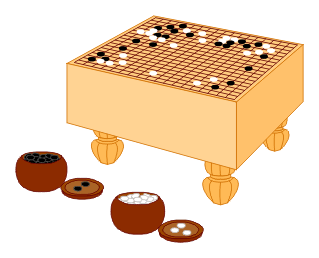GO In The West
BADUK In Korea
IGO In Japan
WEIQI In China
© Craig R. Hutchinson, 15 June 2006

A Contest of
Life, Liberty and the Pursuit of Happiness
INTRODUCTION
Go Connect is one of the first board games
created by man on this planet
more than 3,000 years ago in Asia.
It is a grandfather of the game called
Go in the West,
Baduk in Korea,
Igo in Japan,
and WeiQi in China.
Two players,
one using black stones and the other white stones,
alternately place a stone on an intersection point
of a 19x19 line grid.
Black plays first.
To remain on the grid (Life),
a stone or stone string
must have a vacant adjacent intersection point
on a line extending from the stone or stone string (Liberty).
The player who first connects
opposite edges of the grid with a string
wins the contest (Happiness).
Grid sizes between 5x5 and 21x21 are also used.
A 5x5 line grid facilitates learning to play.
Here are the five simple rules.
RULES

1. OBJECTIVE:
To be the first to connect
opposite edges of the grid with a string.
String: Same color stones on adjacent points of a line.
Connection: A play that creates or expands a string.
Link: A shape for connection.
Group: A set of linked stones and strings.

2. LIBERTY:
A vacant adjacent point
on a line from a stone or string, marked Δ.
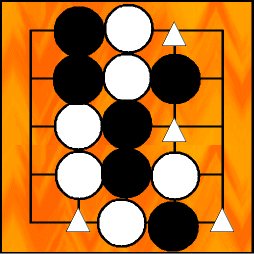
3. CAPTURE:
A string, or a stone not part of a string,
with no liberty is captured.
Check: A string or stone with one liberty,
marked Δ, is in check.
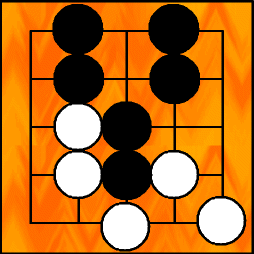
4. PLAY OR PASS:
A play consists of the following three steps:
1) Place a stone on a vacant point;
2) Remove foe's captured stones or strings;
3) Remove own captured stones or strings.
A player may pass (not make a play).
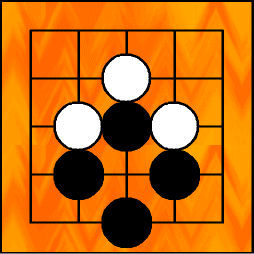
5. REPEAT:
Cannot repeat a grid position.
EXAMPLE GAME 1
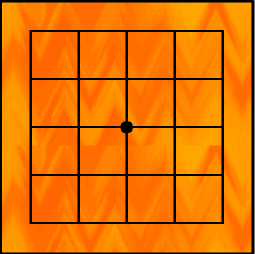
1. START:
A game begins on an empty grid.
Black plays first.
The players alternately place a stone on the grid.
The weaker player is assigned black
and can make N Handicap plays before white plays.
The handicap changes by one after three consecutive wins.
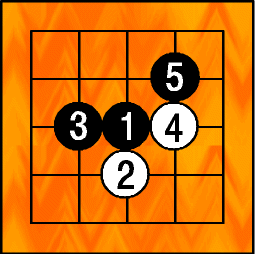
2. BEGINNING STAGE:
The players alternately place a stone on the grid
trying to create, control, and/or assault links/liberties
in order to construct a string
between opposite edges of the grid.
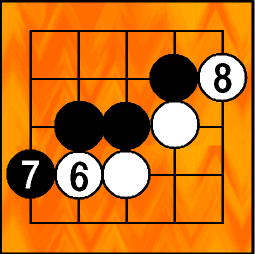
3. MIDDLE STAGE:
The players continue
to try to connect opposite edges of the grid.
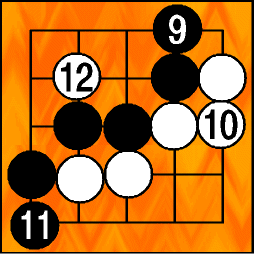
4. END STAGE:
The players continue
to try to connect opposite grid edges.
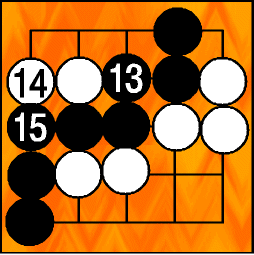
5. FINAL and WINNER:
The game ends when black plays 15
because black was the first
to connect two opposite edges with a string.
QUESTIONS

1. OBJECTIVE:
What is the objective of the game?
In order to construct a string,
what must one create, control, and/or assault?

2. LIBERTIES:
How many liberties does each stone and string have?
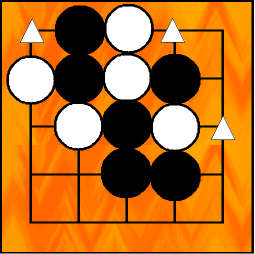
3a. CAPTURE:
What is the result
if black plays on one of the Δ liberties?
What is the result
if white plays on one of the Δ liberties?

3b.CAPTURE:
How are strings constructed in order to prevent their capture?
Construct a string with secure liberties that cannot be occupied.
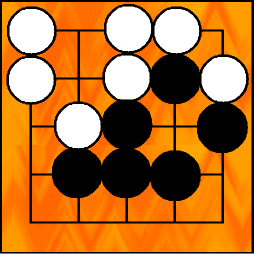
4. PLAY OR PASS:
Which stones or strings are in check?
Which black stones or strings can white capture?
Which white stones or strings can black capture?
Can a player pass; i.e., not make a play?
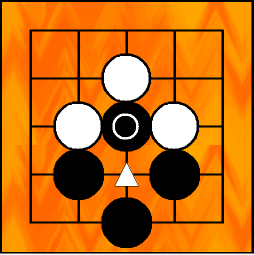
5. REPEAT:
If white plays on the Δ liberty
and captures the Ο stone,
can black immediately follow white's play
by playing on the point previously occupied by the Ο stone?
EXAMPLE GAME 2

1. START:
Who plays first?
If a handicap of 3 is given black,
how many stones does black play on the grid before white plays?
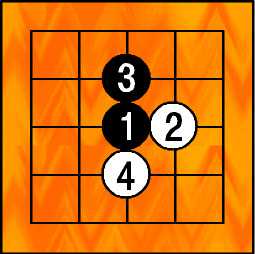
2. BEGINNING STAGE:
What takes place in the beginning stage?
HINT:
Be able to Connect your stones and strings.
Avoid creating many stones and strings
with insecure or no links for connection.
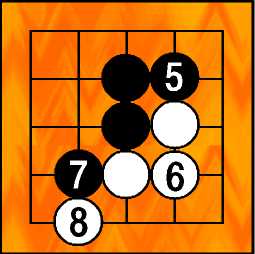
3. MIDDLE STAGE:
What takes place in the middle stage?
HINT:
Find plays that Attack (assault and/or destroy)
foe's insecure links/liberties
and that Defend (create and/or secure)
your links/liberties.

4. END STAGE:
What takes place in the end stage?
HINT: A stone or string with:
Four insecure liberties is weak;
Three insecure liberties is in trouble.
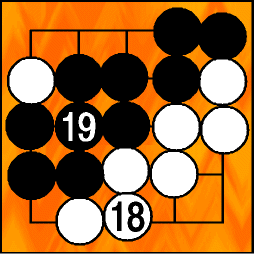
5a. FINAL and WINNER:
Who first created a string between opposite edges of the grid?
Who is the winnrer?
HINT: A stone or string with:
Two insecure liberties is in danger;
One liberty is in check;
Zero liberties is captured.
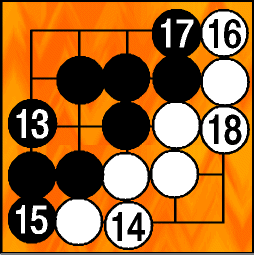
5b. FINAL and WINNER:
After black captures a stone with 13 and the plays 14 to 18,
who is the winner?
HINT:
Find stones and/or strings
in trouble/danger/check.
Count liberties.
Protect your Links/Liberties!!!!
Build secure Link/Liberty Shapes!!!!
Assault foe's connection Link!!!!
Imperil foe's liberty Base!!!!
MORE
INFORMATION
Go Connect is an introductory game
for learning one of this planet's
oldest active board games,
called Go in the West,
Baduk in Korea,
Igo in Japan,
and WeiQi in China.
For more information about
Go, Baduk, Igo, or WeiQi players and clubs in your area,
or on the Internet, contact:
The American Go Association
PO Box 397, Old Chelsea Station
New York City, NY 10113-0397
E-mail: membership@usgo.org
Net: www.usgo.org
or contact Hutch
Phone: 703-698-9811
E-mail: crhutch@erols.com
Net: http://users.erols.com/crhutch/go.html
To obtain books and equipment, contact:
Ishi Press
Phone: 800-859-2086
E-mail: IshiPress@aol.com
Net: http://www.ishigames.com
Kiseido
Phone: 800-988-6463
E-mail: kiseido@yk.rim
Net: www.kiseido.com
Samarkand
Phone: 800-600-4373
E-mail: info@samarkand.net
Net: www.samarkand.net
Slate & Shell
Phone: 800-653-7640
E-mail: bcobb@slateandshell.com
Net: www.slateandshell.com
Yutopian Enterprises
Phone: 800-988-6463
E-mail: sales@yutopian.com
Net: www.yutopian.com
